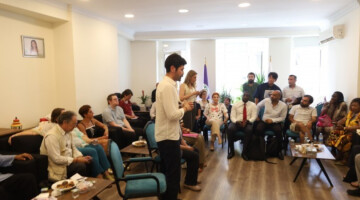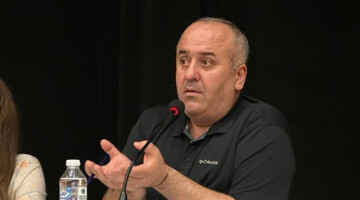The 'Democratic Confederalism' model proposed by Kurdish leader Abdullah Öcalan was discussed in a panel discussion in the Italian capital, Rome, with the participation of different circles.
The panel discussion titled 'A solution for peace in the Middle East: Democratic Confederalism' was hosted by ESC, a social center where university student collectives experience self-management.
The panel was jointly organized by the Kurdistan Information Bureau UIKI-Onlus, Rete Kurdistan, Dinamo Press, Un Punto Per and Ararat Kurdish Cultural Association.
Yılmaz Orkan, Representative of UIKI-Onlus, opened the panel discussion with three sessions. Orkan said that Democratic Confederalism is the only way out of the crises of the system in the 21st century. According to Orkan, this model offers opportunities to the peoples in the region and can transform the Damascus government as well.
Referring to the recent talks between the DEM Party and Abdullah Öcalan in İmralı, Orkan pointed out that this process could pave the way for peace, democracy and the coexistence of peoples.
Giovanni Russo Spena, Spokesperson of the Committee for the Freedom of Abdullah Öcalan, evaluated the analysis of ecology, women's liberation and Marxism in Öcalan’s defenses. Spena said that Öcalan’s ‘democratic nation’ proposal against the nation state is an antidote to nationalism.
In the second session of the panel discussion, presentations were made on behalf of the Academy of Democratic Modernity (ADM) and the Kurdish Women's Movement.
The presentation on behalf of the Academy of Democratic Modernity explained what kind of a system Democratic Confederalism envisages.
The presentation on behalf of the Kurdish women's movement emphasized that the aim of Democratic Confederalism is not only to create practical institutions, but also to create a mentality that will intellectually break away from power, patriarchy and hierarchy.
In the last session of the debate, members of the delegation that visited Rojava between January 22-27 took the floor. The UIKI representative made a presentation on the changing conjunctural situation with the fall of the Baath regime. Pointing out that Abu Hatem Shaqra, who murdered Kurdish politician Hevrîn Xelef in Rojava, is in the new HTS leadership, he said, “It is too early to say that the government will establish a democratic administration in the region.”
Un Punto Per Representative Fabio Alberti said that he was impressed by the creation of a self-sufficient and accessible health system in North-East Syria despite all the impossibilities.
Daniele Galie, who was part of the delegation on behalf of Dinamo Press, pointed out that the projects in the field of health and ecology, free healthcare, etc. in the region prove that Abdullah Öcalan’s paradigm is being put into practice.
Roberto Eufemia, Member of the Municipal Council-Rome, stated that he observed how Öcalan’s paradigm has spread to all segments of society, and how Democratic Confederalism was built in the region on two axes based on possibilities and responsibilities. He underlined the feasibility of this proposal.












